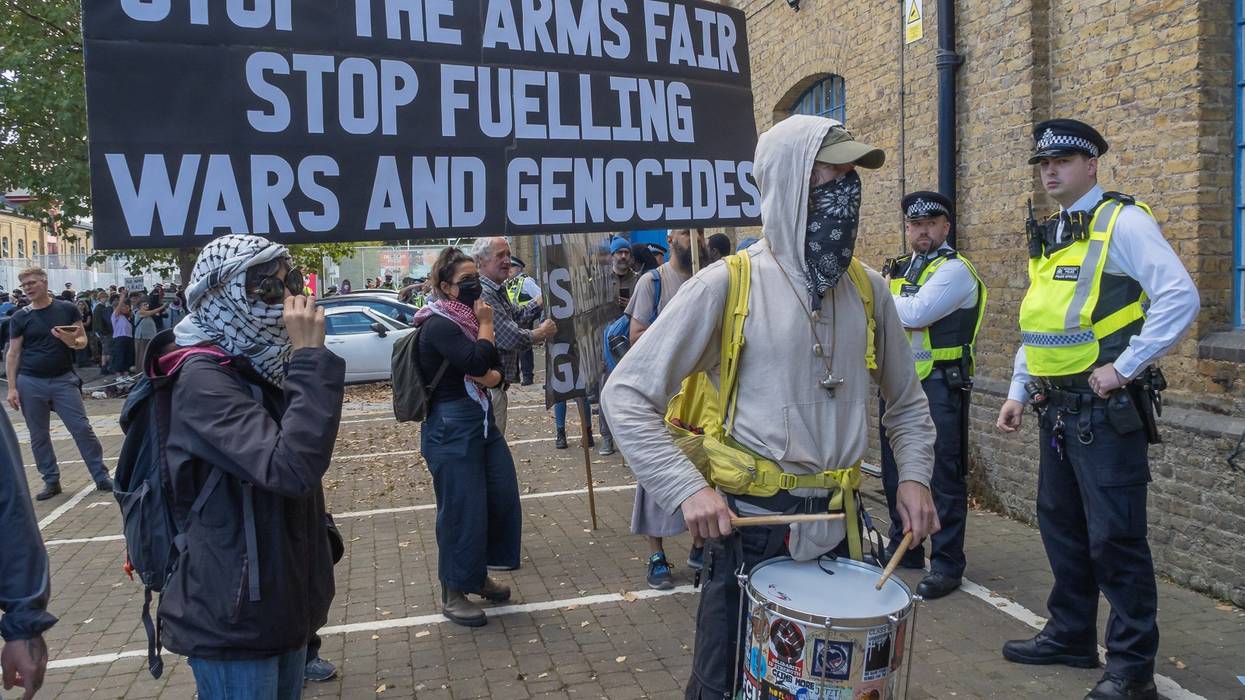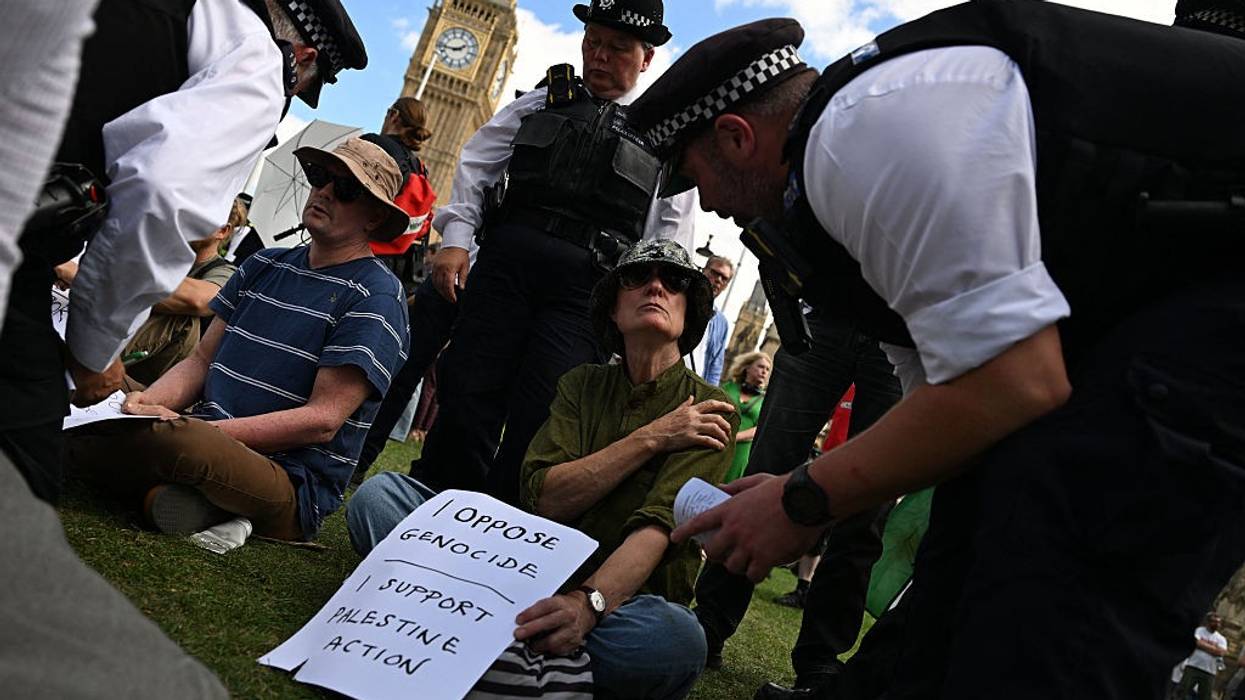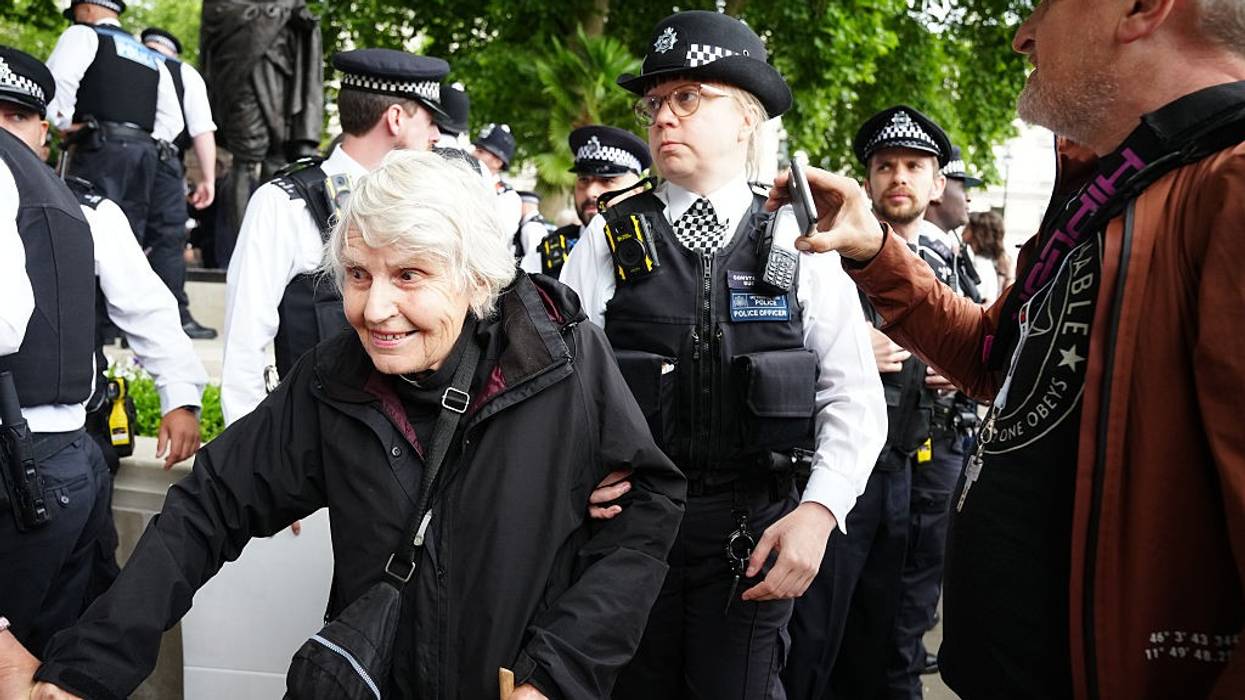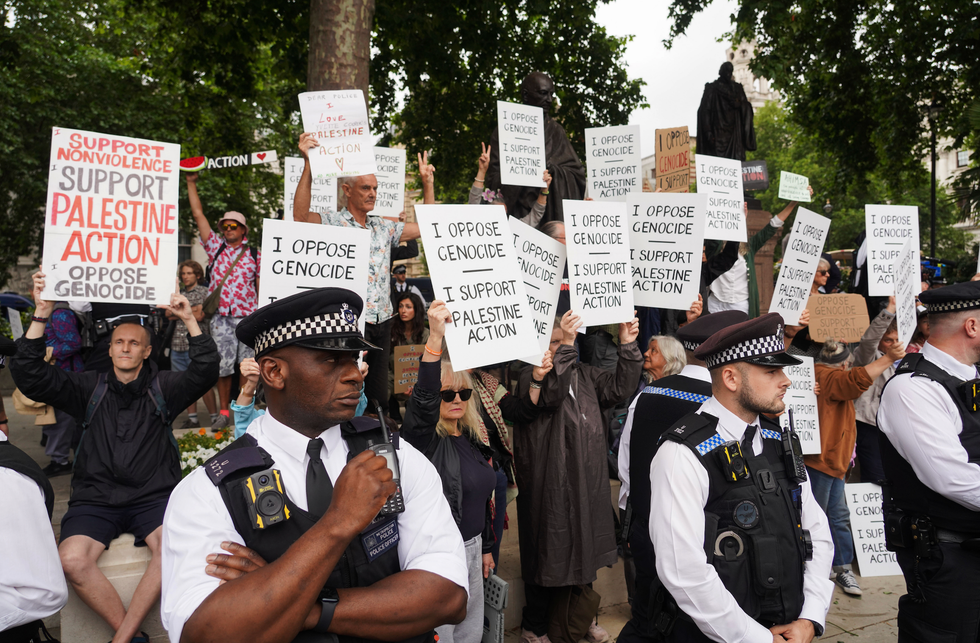Thousands Protest London Weapons Fair Over UK Complicity in Gaza Genocide
"The people who run these companies are war criminals," said one campaigner. "They should be investigated for crimes against humanity, not invited to profit from the unspeakable devastation they have caused."
Thousands of demonstrators rallied Tuesday outside a major London arms fair to protest what one campaigner called the United Kingdom's "peak complicity in genocide" in Gaza, where Israeli forces have killed more than 64,600 Palestinians—mostly women and children—and wounded over 163,000 others since October 2023.
The Independent reported at least three arrests for alleged assaults on police officers outside the the biennial Defense and Security Equipment International (DSEI) UK trade show, which is being held at Excel London at the Royal Victoria Dock. At least one person was also reportedly taken away in an ambulance.
Video posted to social media showed police officers shoving people to the ground, as well as DSEI attendees smirking and recording on their phones as they passed demonstrators.
Protesters chanted "shut it down," waved Palestinian flags, and held up signs with messages like "stop arming Israel," "only war criminals past this point," and "we hope that the screams of babies will haunt them in their sleep."
Ajahn Santamono, a Buddhist monk taking part in Tuesday's protest, lamented to Middle East Eye that "people who contribute to genocide and mass murder are protected and supported, while people of conscience who try to protest this are the ones who are arrested, criminalized, and treated with violence."
On Monday, members of the direct action group Shut the System sabotaged fiber optic internet cables and splashed red paint over portions of the DSEI venue.
"How can anyone with a shred of humanity build their fortune on mass slaughter?" the group asked. "Shut the System's answer—they are a symptom of a global financial system that prioritizes extreme, psychopathic profiteering for growth's sake alone, above solid healthcare and the natural support systems underpinning all life on Earth."
More than 50 Israeli arms manufacturers and US weapons giants including Lockheed Martin—which makes the F-35 fighter used by the Israel Defense Forces (IDF) to bomb Gaza—are among the approximately 1,600 exhibitors taking part in DSEI.
The United States is far and away the world's leading enabler of Israel's war on Gaza, which is the subject of an ongoing International Court of Justice genocide case and International Criminal Court arrest warrants for Israeli Prime Minister Benjamin Netanyahu and former Defense Minister Yoav Gallant.
Some of the IDF's most powerful arms—including 1,000- and 2,000-pound bombs that have been repeatedly used to massacre Palestinian civilians—are provided by the United States and the tens of billions of dollars in armed aid it lavishes upon Israel.
"The US and Europe-backed slaughter of families in Palestine is the frontline of our struggle for climate and social justice globally," said Shut the System. "If we can't stop this genocide, power holders will use it as a blueprint to commit genocides elsewhere."
The advocacy group Campaign Against Arms Trade (CAAT) said ahead of DSEI that the UK government "keeps insisting it is doing everything in its power to hold the Israeli government to account for its actions."
However, a report published by the group last week shows that "this is an outrageous and offensive lie."
The report notes that "the UK is deeply complicit in supporting Israel's genocide in Gaza: through arms sales, [Royal Air Force] reconnaissance flights over Gaza, from which it is suspected intelligence is shared with Israel, training of Israeli soldiers, and other forms of military cooperation."
According to the report:
Despite the government's decision on September 2, 2024 to suspend arms export licenses to Israel... they are still allowing the supply of crucial components for Israel's 45 F-35 combat aircraft, so long as they are supplied indirectly via the US or other countries, rather than directly to Israel. These are used to bomb Gaza, at an extraordinary level of intensity, requiring a constant supply of spare parts. By its own admission at the time of the decision, the government accepts that these UK-supplied components may well be used by Israel to violate international humanitarian law in Gaza.
CAAT media coordinator Emily Apple said that the UK has "reached peak complicity in genocide in allowing 51 Israeli arms companies to exhibit at DSEI."
"It is allowing companies to market their genocide tested weapons to human rights abusing countries around the world," Apple added. "The people who run these companies are war criminals. They should be investigated for crimes against humanity, not invited to profit from the unspeakable devastation they have caused in Gaza."
Other actions Tuesday included a Quaker meeting at Waterloo Station attended by around 200 people, part of No Faith in War Day.
As part of the No Faith in War day, 200 people joined our Meeting for Worship, creating a grounded space in the face of the violence embodied by the DSEI arms fair.Tomorrow, join us to hand in a demand to stop DSEI. Meeting Waterloo train station, 11am: tinyurl.com/stop-dsei📸 Michael Preston
[image or embed]
— Quakers in Britain (@quaker.org.uk) September 9, 2025 at 8:02 AM
Anti-DSEI protests are set to continue Wednesday, when the Palestine Solidarity Campaign is planning a 5:00 pm "pots and pans protest" meant to "greet the arms traders with a wall of noise."
The protests against DSEI follow last weekend's arrest of nearly 900 supporters of the banned UK-based group Palestine Action in London's Parliament Square.



 Members of the group Defend Our Juries publicly declare their opposition to Israel's genocidal assault on
Members of the group Defend Our Juries publicly declare their opposition to Israel's genocidal assault on